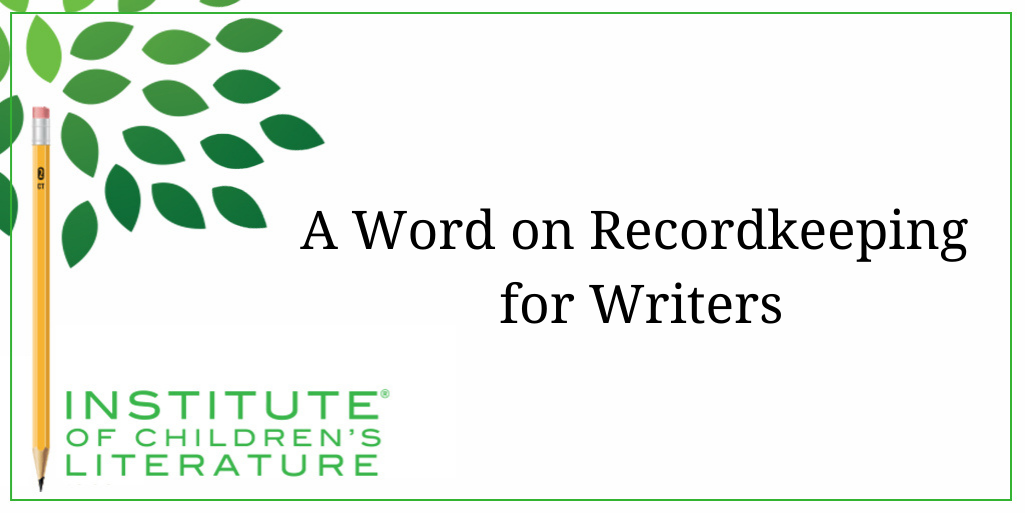
5 Ways Writers Can Prep for 2025 Goal Setting
Before we roll on to the new writing year, let’s harness our optimism for the blank slate before us and prepare for our 2025 Goal Setting just for writers.

We teach our students how to write and get published!
View our Course Catalog >
No discussion of writing and money is complete without talking about recordkeeping. Careful recordkeeping for writers helps cut down on time when it comes to filing taxes, and helps you make better use of your time by knowing what is working and what is not.
For many, one of the best ways to keep track of income and expenses is to have a separate checking account that you use to pay for any writing-related expense (conferences, classes, office supplies, postage) and where you deposit money you make writing. This will help you avoid confusion and let you avoid missing important writing expenditures (that you may need to know when invoicing or when paying your taxes). I’ll admit, I don’t do this, but I do have someone who takes care of my taxes. He is much better at numbers than I am and he keeps track of every cent I spend on writing-related expenses and every cent I take in for my writing (and I married him, so that should keep him on the job).
However you handle keeping track, you really must do so. For one, as your writing begins to bring in steady money, the government becomes very interested in how much you make, and if you are ever audited, having good records will save you stress and money.

Recordkeeping for writers will sometimes mean sending an invoice. Some publishers have a specific style of invoice they want you to use. Others expect you to create an invoice on your own. Neither way is difficult, but you will need to make yourself a note if you’re going to need to use the proprietary invoice rather than your own. Many word processing and spreadsheet programs have templates for invoices to make things a little easier. When creating an invoice of your own, there are certain things that should always be part:
PUBLISHER NAME (this helps you keep track of who the invoice is billing)
BILLING CONTACT (you can’t always do this, but sometimes you’re told who handles billing)
INVOICE DATE
INVOICE CODE (For some reason, publishers often ask for this. If there is a project code, I’ll use that, but otherwise, I simply come up with something short)
YOUR NAME
YOUR ADDRESS (I put this even if I am being paid via direct deposit)
YOUR EMAIL/YOUR PHONE (I’ll admit, I don’t usually add a phone number, since I hate the phone, but I’ll always include an email address.)
ITEM TITLE (With this, I include the title, genre, sometimes the series name or the name of the imprint, just any information that might help make the thing being sold very clear. I will also note the date the item was received/accepted by the publisher)
AMOUNT DUE
[This can be done in several ways. If I’m invoicing for several things at once, I’ll put the cost of each thing next to the ITEM TITLE and then add them up for AMOUNT DUE. If I have ADDITIONAL FEES (like research fees or consultant fees or travel feels), I’ll add in a line for that after the ITEM TITLE and I’ll make it very clear what I’m billing for. If I’m invoicing for only one thing, I’ll simply put an amount due.]
If I feel I need to add more information about the project or add other remarks (such as a note that this is the third invoice for the same item or remind them that they are 60 days past the 90-day payment promised in the contract) I’ll add one more line with the heading:
ADDITIONAL REMARKS/COMMENTS. [I generally don’t need to add any remarks, but sometimes it happens.]
Every time you generate an invoice, you need to keep a copy. I keep a copy in a file, and I also add the date to the calendar on the corkboard next to my desk so I can quickly find when I sent the last invoice.
Basically, keeping invoices for all money owed to you, and a method of tracking all money you spend on your writing (such as keeping a separate bank account for it) is the basics needed for financial recordkeeping for writers. You also need to keep up with receipts, contracts, tax forms (some publishers require writers fill out W-9 form), and other money bits and bobs. Having a solid filing system (either hard copy or virtual) goes a long way toward helping you stay on top of your finances which becomes more and more important as you become more successful. Don’t wait until you make “real” money. Build good recordkeeping habits early and they’ll serve you well throughout your writing career.
With over 100 books in publication, Jan Fields writes both chapter books for children and mystery novels for adults. She’s also known for a variety of experiences teaching writing, from one session SCBWI events to lengthier Highlights Foundation workshops to these blog posts for the Institute of Children’s Literature. As a former ICL instructor, Jan enjoys equipping writers for success in whatever way she can.

Before we roll on to the new writing year, let’s harness our optimism for the blank slate before us and prepare for our 2025 Goal Setting just for writers.

Writers can be thin-skinned when it comes to getting feedback on their work. Let’s look at 4 ways to positively deal with constructive criticism!

Rejection is part of the territory when it comes to being a writer. Today we offer reflection for writers to help redirect your efforts after a rejection.
1000 N. West Street #1200, Wilmington, DE 19801
© 2024 Direct Learning Systems, Inc. All rights reserved.
1000 N. West Street #1200, Wilmington, DE 19801
© 2024 Direct Learning Systems, Inc. All rights reserved.
1000 N. West Street #1200, Wilmington, DE 19801
© 2024 Direct Learning Systems, Inc. All rights reserved.
1000 N. West Street #1200, Wilmington, DE 19801
© 2025 Direct Learning Systems, Inc. All rights reserved.
1000 N. West Street #1200, Wilmington, DE 19801
©2025 Direct Learning Systems, Inc. All rights reserved. Privacy Policy.